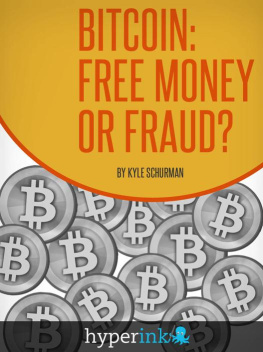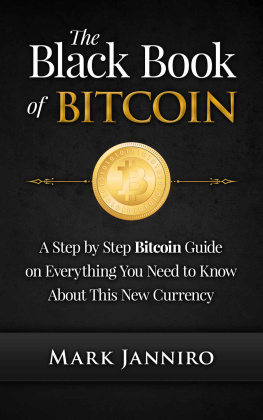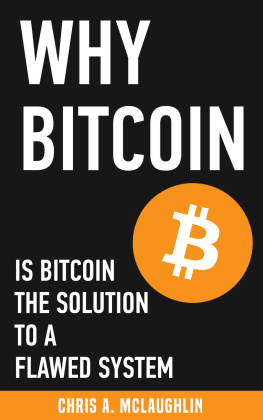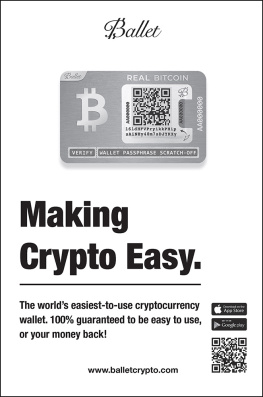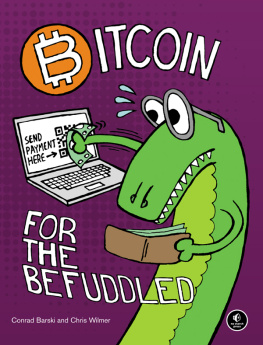THE BITCOIN SKEPTIC
CONSIDERATIONS BEFORE YOU PROCEED
Marc C. Rush
Copyright 2013 by Marc C. Rush
All rights reserved. No part of this publication may be reproduced, transmitted, stored in a system for retrieval, in any form or means, recording, mechanical, photocopying, electronic, or other means, without prior permission. To All Those Who Dont Believe The Banksters And Are In Search Of A Safer, Better And More
Effective Store Of Value
This book should in no way be construed as financial/investment advice. Consult your financial advisor (and/or your thinking cap) before making any financial decisions.
Contents
Introduction
Thefts
Price Fluctuations
Hoarding
Anonymity
Why Does Bitcoin Have Value?
Opportunity Cost Of Investing In Bitcoin Shut Down The Internet
E-Gold
Conclusion
Introduction
It is completely understandable that people are looking for new places to put their money.
Central banks are printing money at an unbelievable rate, and running up debt to astronomical levels. This calls into question not only the sustainability of such actions, but the value and sustainability of these currencies themselves.
Interest, even on a long-term certificate of deposit is under 2 % which means, when inflation (especially food and energy) is taken into account, you are losing money by leaving it in a bank. In such an environment, it is only natural for people to look for a better hedge against inflation.
And then there is Cyprus. The original plan to bail-out the banks there included taking money from depositors, even insured depositors. The final plan spared the insured depositors, but there are capital controls limiting how much money depositors can withdraw from the banks. A logical question is where else could this happen next?
Also, the government, especially post9/11 is tracking everything. Your phone calls, emails and certainly your financial transactions. Oh how nice it would be to give Uncle Sam a great big middle finger and say, Sammy, you cant track me now. Ha ha ha.
For all of these reasons, it is understandable that people would be looking for some place new to put their money, especially a place that is more financially secure and somewhat anonymous.
Enter Bitcoin (BTC). If you believe the proponents of it, BTC solves all these problems, and (because they say there will be a finite number of them) will continue to increase in value long into the future.
Recent history suggests that BTC is not the panacea its proponents would have you believe. We will get back to this in great detail, but first, by way of background and necessity, will be a very brief description of what BTC is and how it works.
BTC was created in 2009 by someone using the name Satoshi Nakamoto. He used cryptography to create a digital currency.1
The creator designed BTC with a proofof-work component whereby people voluntarily allow their computers to be used as part of a verification process.2
In exchange for this, the people who successfully crack the code can receive free BTCs, although they are not really free when one takes into account the $1000 plus cost of the necessary computing equipment and the electricity to run it. The other way people can obtain BTCs is by buying them from an exchange or elsewhere.
Once one has BTCs, they can redeem them for currencies or spend them at merchants who accept them. In order to spend or redeem BTCs, once has to prove he is the rightful owner of them.
To prove this, the owner of the BTCs has a 51 character secret number called a private key.3
1 http://en.wikipedia.org/wiki/Bitcoin
2 http://bitcoin.org/bitcoin.pdf
3 https://en.bitcoin.it/wiki/Securing_your_wallet
This key can be kept by the individual owner on their computer, on removable media like a flash drive, or even written on a piece of paper. BTCs can also be kept on a third party website referred to as an exchange which would allow deposits, withdrawals and payments.4
The promises of BTC are an electronic payment system, privacy/anonymity and nowadays many claim it is a hedge against inflation or even an investment.
THEFTS/HACKS
One reason people put money in a bank, and do not leave all of it under their mattress is they are concerned it might be stolen if they leave it at home. Granted we can have a discussion about whether a bank paying you one-percent interest which does not keep up with inflation is its own sort of theft, as well as concerns about uninsured deposits being confiscated in Cyprus, but generally speaking, in most instances, one of the reasons you put money in a bank is for reasons of security. Does BTC provide the same level of security?
In September of 2012, $250,000 worth of BTCs were stolen from a America called Bitfloor.5 BTC exchange in
Bitfloor closed operations as a result of this theft, and customers lost all their BTCs stored on this exchange.
4 https://en.bitcoin.it/wiki/Ways_to_store_Bitcoins 5 http://www.economist.com/node/21563752
Subsequent to this, Bitfloor began operating again, with a commitment to try and return users funds, and that the exchange now has greater security.6 How reassured are you?
Mt. Gox is estimated to handle over 80% of all BTC trade.7 In June 2011, on this most popular BTC exchange, the price of BTCs went from $17 to less than a dollar in minutes.8
At that time, trading was suspended and Mt. Gox blamed the crash on a compromised user account. As a result of this hack, Mt. Gox users had their usernames, email addresses and passwords put on the internet for all to see.
Earlier in the same week, a weakness with Mt. Gox was reported in which an attacker could take over a users account.9
In March of 2012, $228,000 worth of BTCs were stolen from eight customers of a popular webhosting company by taking advantage of a vulnerability.10
6 http://bitcoinmagazine.com/bitfloor-back-inbusiness/
7 https://mtgox.com/
8 http://arstechnica.com/tech
policy/2011/06/bitcoin-price-plummets-oncompromised-exchange/
9 https://bitcointalk.org/index.php?topic=18709.0
The webhosting company put out a statement advising that security was their top priority and they would be reviewing procedures to prevent a reoccurrence.11Thats good enough for me.
In May of 2012 the exchange Bitcoinica was hacked and $90,000 worth of BTCs were stolen.12 Instead of being able to access their accounts, users of this exchange were redirected to a porn site. Bitcoinica is no longer in business.13
In March of 2013, an account at BTC payment processor Bitinstant was hacked and $12,000 worth of BTCs were stolen.14
In a blog post about the theft, Bitinstant said in part, The attacker is not highly technically skilled. That makes me wonder how extensive the financial loss could have been and
10 http://arstechnica.com/business/2012/03/bitcoinsworth-228000-stolen-from-customers-of-hackedwebhost/
11 http://status.linode.com/2012/03/managersecurity-incident.html
http://www.theregister.co.uk/2012/05/15/bitcoinica _hack/
13 https://en.bitcoin.it/wiki/Bitcoinica
14 http://techcrunch.com/2013/03/08/hacker-steals12000-worth-of-bitcoins-in-brazen-dns-based-attack/
could be from someone who is highly technically skilled.
Also in March 2013, the largest BTC exchange in Brazil was hacked, taken offline and users were not guaranteed of getting all of their funds returned.15 The owner of the exchange sent an email to users stating that he would try to pay back what he could, whatever that means.
What are we to make about the hacks/thefts of BTCs? One proponent of BTC dismissed such concerns stating, Dont worry about the occasional BTC hack, pioneers always end up with a few arrows in their back16
Do you want to be a pioneer?
As unenthused as one could be about bank accounts, they have their advantages. If your bank goes bust, your insured deposits are protected (barring the unthinkable). If someone steals your credit cards and runs up bills, you are protected. If someone steals money from your bank account you can go to local, state and federal law enforcement for assistance.



